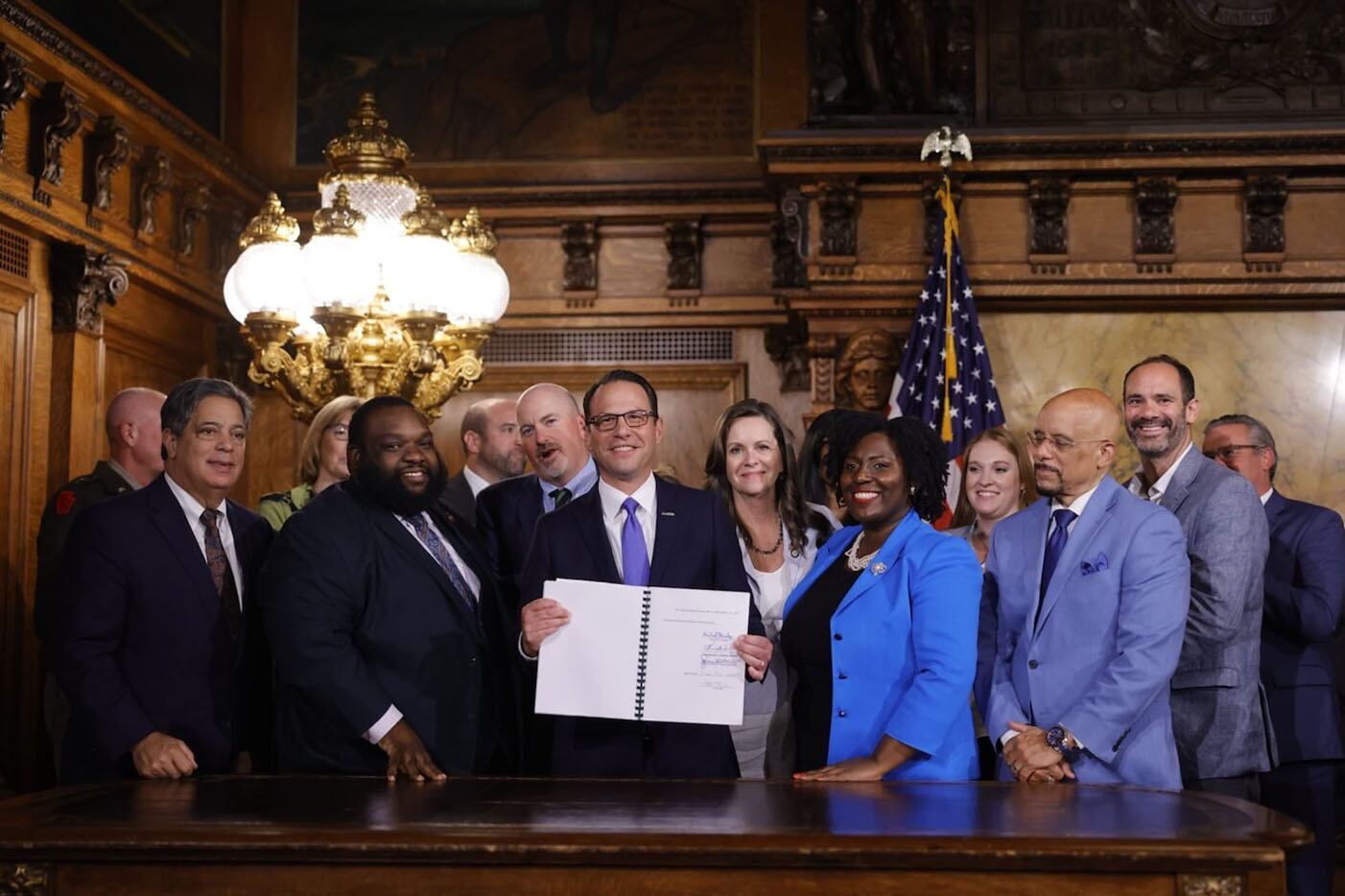Sign up for Chalkbeat Philadelphia’s free newsletter to keep up with the city’s public school system.
Pennsylvania’s new $47.6 billion budget includes an historic increase in education funding. But advocates and school officials say it falls short of the transformational change Philadelphia schools need.
The new budget, signed by Gov. Josh Shapiro late Thursday night, includes $1.1 billion more for K-12 education — the state’s biggest one-year increase for school spending in history, according to Shapiro. That increase includes $232 million more for Philadelphia schools.
The budget also includes funding for solar projects at schools, $20 million more for student-teacher stipends, $17.7 million more for early childhood education, a $100 million increase in special education funding, and $100 million to reimburse school districts for payments they make to cyber charter schools.
The accompanying school code bills that passed along with the budget also create a funding stream for lockable cell phone pouches, require every school district in the state to employ a school security officer, and establish a certification pathway for non-U.S. citizens to become teachers in Pennsylvania.
The budget deal reflects a compromise between Shapiro, the Democratic-controlled House, and the Republican-controlled Senate. It leaves out many far-reaching programs and reforms that the governor and lawmakers pushed for during various phases of budget negotiations.
There’s no Jay-Z-backed school voucher program. There’s no seven-year timeline to move the state towards closing its unconstitutional funding gaps between wealthy and less affluent school districts. There’s no wholesale reform of how cyber charter schools are funded and monitored. And there’s no new money to fund grow-your-own teacher recruitment programs.
A bipartisan early literacy bill that would have aligned school district curriculum and teacher training statewide with the science of reading also did not survive budget negotiations. However, Philadelphia schools will start next school year with new English Language Arts curriculum district officials claim is research-backed. The district approved the new curriculum as part of its budget process.
For many public education advocates, the budget’s failure to establish a plan or timeline to close the so-called “adequacy gaps” in per-pupil spending between the state’s wealthy and low-income districts was a major misstep that will hurt Philadelphia significantly. Advocates say without such a timeline, the legislature will fail to fully satisfy a Commonwealth Court judge’s ruling in 2023 that declared Pennsylvania’s school funding system unconstitutional.
In earlier drafts of the budget, lawmakers proposed raising state education funding over a seven-year span. That represented an effort to gradually close “adequacy gaps” in per-pupil spending between districts, but also cushion the one-time impact on the state’s rainy-day fund and reduce the possibility of big education increases one year and major cuts the next.
“The same budget legislation that admits the scope of the Commonwealth’s constitutional shortfall still leaves nearly 90% of that hole to be filled by some undefined date in the future, or not at all,” the Education Law Center and Public Interest Law Center said in a joint statement Friday.
Philadelphia schools Superintendent Tony Watlington said in a statement Friday that the budget deal is the first step toward closing the adequacy gap – “a first step that has been decades in the making.”
But Watlington also noted that while “this budget is the beginning of amending the impact of cyber charter school funding,” it does not go far enough.
The state’s fiscal 2025 budget is coming at a pivotal time for Philadelphia families and educators.
Federal COVID relief funds for schools are sunsetting this year, putting many school resources in jeopardy. Philadelphia’s aging school buildings still need billions of dollars in repairs, the city is struggling to recruit and retain teachers, Mayor Cherelle Parker and Watlington are embarking on a plan to create year-round educational opportunities. And the district has projected budget deficits in the coming years if state spending doesn’t continue to increase.
The Philadelphia Board of Education adopted its $4.5 billion budget in May, with an assumption that the district would get an estimated $240 million increase in state aid. That prediction turned out to basically match the final budget signed by Shapiro, a Democrat. However, the state’s Basic Education Funding Commission determined that Philadelphia is underfunded by at least $1.4 billion annually.
Philadelphia Federation of Teachers President Arthur Steinberg said in a statement Friday the final budget package “falls short of transformational reform of Pennsylvania’s unconstitutional and inequitable system of funding public education.” He added that “the wild west of under regulated cyber charters also went untouched.”
State Rep. Morgan Cephas, a Democrat who represents Philadelphia, said in a statement that the budget is far from perfect but represents “a solid compromise.”
“Philadelphia students will soon be able to look across the city limits and see that they have the same facilities, opportunities and possibilities as the kids in neighboring, suburban counties,” Cephas said. “Our kids deserve this.”
Carly Sitrin is the bureau chief for Chalkbeat Philadelphia. Contact Carly at csitrin@chalkbeat.org.
Azia Ross is a summer intern for Chalkbeat Philadelphia. You can reach her at aziaross@chalkbeat.org.






